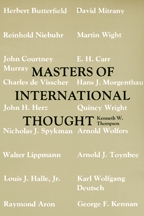
250 pages / 6.00 x 9.00 inches / no illustrations
Political Science & Political History | Reference
The complexities of modern politics and international relationships sometimes overwhelm us. Kenneth W. Thompson here offers clarity to replace obscurity, personal warmth and human values to replace abstractions. He states the aim of Masters of International Thought early: to introduce the ideas of eighteen “men of large and capacious thought” about twentieth-century international relations.
To organize their thought, Thompson divides his book into four intellectual classifications—the search for norms, the concept of power politics, the significance of the Cold War, and the future of world order. In his introduction to each of the four sections, he describes the context of the general topic and the particular thinker. In each of the eighteen discussions, he includes the subject’s biography, writings, underlying assumptions about politics and humanity, views about the structure of politics, and the role and limits of power, ending with a bibliography of primary and secondary works.
Masters of International Thought presents thinkers who assimilate practical ethics and religion (Butterfield, Niebuhr, Murray, Wight); who eschew utopia for the reality of power politics (Carr, Morgenthau, Spykman, Wolders, Herz, Deutsch); who regard the Cold War as a mirror of the human condition (Lippman, Kennan, Halle, Aron); and who speculate about the possibilities of world order (Wright, Mitrany, de Visscher, and Toynbee).
Thompson was guided in his selections by the enduring value of these men’s thought. Even those works that re fifty years old are still read by policy makers and scholars, Thompson points out. He also acknowledges his personal approach to these masters, for not only has he known their works, he has known many of the writers. He admits that they are “intellectual giants, but they are human beings, not gods.” In Masters of International Thought, he clearly fulfills his aim to share the wisdom and knowledge of these twentieth-century thinkers.
Found an Error? Tell us about it.